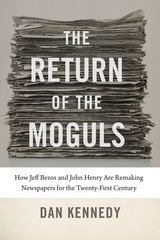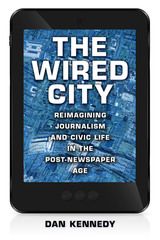2 books about Kennedy, Dan

The Return of the Moguls
How Jeff Bezos and John Henry Are Remaking Newspapers for the Twenty-First Century
Dan Kennedy
University Press of New England, 2018
The Return of the Moguls chronicles an important story in the making, one that will affect more than just the newspaper business—it has the power to change democracy as we know it. Over the course of a generation, the story of the daily newspaper has been an unchecked slide from record profitability and readership to plummeting profits, increasing irrelevance, and inevitable obsolescence. The forces killing major dailies, alternative weeklies, and small-town shoppers are well understood—or seem obvious in hindsight, at least—and the catalog of publications that have gone under reads like a who’s who of American journalism. During the past half-century, old-style press barons gave way to a cabal of corporate interests unable or unwilling to invest in the future even as technological change was destroying their core business. The Taylor family sold the Boston Globe to the New York Times Company in 1993 for a cool $1.1 billion. Twenty years later, the Times Company resold it for just $70 million. The unexpected twist to the story, however, is not what they sold it for but who they sold it to: John Henry, the principal owner of the Boston Red Sox. A billionaire who made his money in the world of high finance, Henry inspired optimism in Boston because of his track record as a public-spirited business executive—and because his deep pockets seemed to ensure that the shrunken newspaper would not be subjected to further downsizing. In just a few days, the sale of the Globe was overtaken by much bigger news: Jeff Bezos, the founder of Amazon and one of the world’s richest people, had reached a deal to buy the Washington Post for $250 million. Henry’s ascension at the Globe sparked hope. Bezos’s purchase seemed to inspire nothing short of ecstasy, as numerous observers expressed the belief that his lofty status as one of our leading digital visionaries could help him solve the daunting financial problems facing the newspaper business. Though Bezos and Henry are the two most prominent individuals to enter the newspaper business, a third preceded them. Aaron Kushner, a greeting-card executive, acquired California’s Orange County Register in July 2012 and then pursued an audacious agenda, expanding coverage and hiring journalists in an era when nearly all other newspaper owners were trying to avoid cutting both. The newspaper business is at a perilous crossroads. This essential book explains why, and how today’s new crop of media moguls might help it to survive.
[more]

The Wired City
Reimagining Journalism and Civic Life in the Post-Newspaper Age
Dan Kennedy
University of Massachusetts Press, 2013
In The Wired City, Dan Kennedy tells the story of the New Haven Independent, a nonprofit community website in Connecticut that is at the leading edge of reinventing local journalism. Through close attention to city government, schools, and neighborhoods, and through an ongoing conversation with its readers, the Independent's small staff of journalists has created a promising model of how to provide members of the public with the information they need in a self-governing society.
Although the Independent is the principal subject of The Wired City, Kennedy examines a number of other online news projects as well, including nonprofit organizations such as Voiceof San Diego and the Connecticut Mirror and for-profit ventures such as the Batavian, Baristanet, and CT News Junkie. Where legacy media such as major city newspapers are cutting back on coverage, entrepreneurs are now moving in to fill at least some of the vacuum.
The Wired City includes the perspectives of journalists, activists, and civic leaders who are actively re-envisioning how journalism can be meaningful in a hyperconnected age of abundant news sources. Kennedy provides deeper context by analyzing the decline of the newspaper industry in recent years and, in the case of those sites choosing such a path, the uneasy relationship between nonprofit status and the First Amendment.
At a time of pessimism over the future of journalism, The Wired City offers hope. What Kennedy documents is not the death of journalism but rather the uncertain and sometimes painful early stages of rebirth.
Although the Independent is the principal subject of The Wired City, Kennedy examines a number of other online news projects as well, including nonprofit organizations such as Voiceof San Diego and the Connecticut Mirror and for-profit ventures such as the Batavian, Baristanet, and CT News Junkie. Where legacy media such as major city newspapers are cutting back on coverage, entrepreneurs are now moving in to fill at least some of the vacuum.
The Wired City includes the perspectives of journalists, activists, and civic leaders who are actively re-envisioning how journalism can be meaningful in a hyperconnected age of abundant news sources. Kennedy provides deeper context by analyzing the decline of the newspaper industry in recent years and, in the case of those sites choosing such a path, the uneasy relationship between nonprofit status and the First Amendment.
At a time of pessimism over the future of journalism, The Wired City offers hope. What Kennedy documents is not the death of journalism but rather the uncertain and sometimes painful early stages of rebirth.
[more]
READERS
Browse our collection.
PUBLISHERS
See BiblioVault's publisher services.
STUDENT SERVICES
Files for college accessibility offices.
UChicago Accessibility Resources
home | accessibility | search | about | contact us
BiblioVault ® 2001 - 2024
The University of Chicago Press









